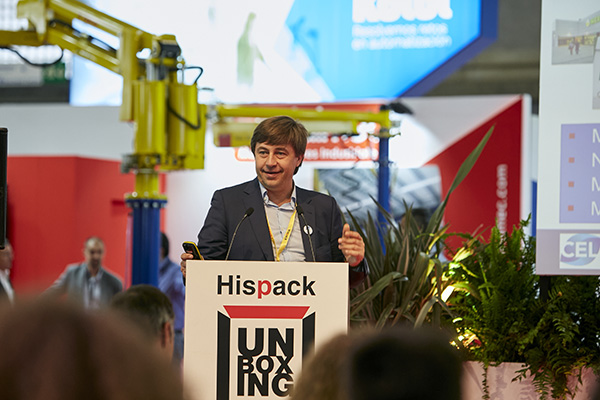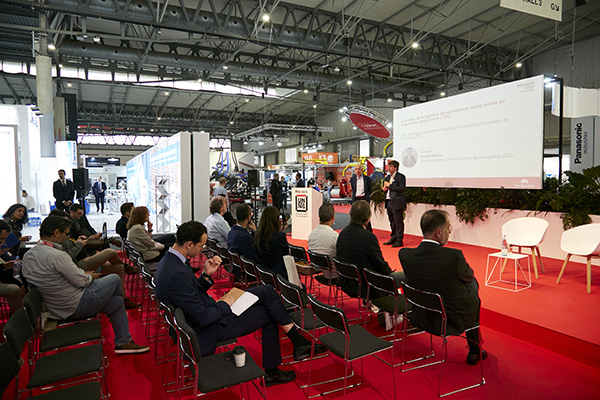How should intralogistics evolve? At Hispack, together with the Spanish Logistics Centre (CEL), six start-ups presented technologies that resolve the daily challenges of end-of-line and last-mile operations and demonstrated how their innovations can have a direct impact on the efficiency of the packaging value chain and the supply chain.
The proposals of these six emerging companies are even more valuable in the wake of the pandemic as a result of the changes in consumption habits, as Ramón García, the general manager of CEL, explained. “Before Covid-19, fewer than 30% of e-commerce transactions required a physical delivery, but, after the pandemic, the figure has risen to 60%. In 2022, 12% of all commerce in Spain is online”.

Given this scenario, logistics faces very specific challenges that these start-ups have identified. They include:
#1 – The focus is still on the customer experience. However, this experience is increasingly diverse, less professional, highly focused on the price and specific deals and very demanding in terms of the quality of the service.
#2 – Logistics must address congestion and ensure sustainability. More than 60% of congestion is generated by professional transport. “We continue to detect poor optimisation of the routes, half-empty trucks distributing, overlapping of time slots and so on,” explained García.
#3 – Profitability of operations. According to the statistics, logistics accounts for between 60% and 80% of a company’s costs in its sales: Similarly, it’s key to the business profitability equation, and full management automation is now a must.
#4 – The management of reverse logistics, a term used to refer to a customer returning a product, companies returning stocks and the reconditioning and recycling of used products. The challenges range from the proper collection of the product to the optimal planning of the processes (transport, product classification, reincorporation into the inventory, end-of-life management, etc.).
#5 – The diversity of the actors involved in the supply chain is forcing us to redefine the relationship maps between them and, above all, to create shared information frameworks which, while protecting traceability at all times, can prove to be areas for interaction.
Ranging from the use of artificial intelligence and big data to improve storage capacities to a cloud providing visibility for all the companies involved in the supply chain management, these are the six proposals that CEL has identified as disruptive technologies that can change the way we manage logistics:
- Estoko Logistics (https://estoko.com). A new way of understanding storage and logistics, interconnecting, via a cloud and artificial intelligence, companies that need flexible storage spaces (because they have a product that must be close to the consumer, because they have a changing supply chain, etc.) with other companies that have excess unused storage capacity and “rent” the available spaces throughout limited periods of time at very competitive prices.
- AllRead (https://www.allread.ai). OCR detection and reading software for Ports and Industry 4.0 based on deep learning and computer vision. Pre-existing fixed or mobile cameras are connected to the AllRead platform, which is capable of reading the codes of freight containers, UIC wagons, registration numbers, counters, air cargo units and bar and QR codes. With digitalised information, goods are almost fully traceable.
- Freightol (https://www.freightol.com). A Transport 4.0 tool that enables forwarding agents and production companies to quote, compare, book and purchase transport freight around the world. Freightol Manager reduces the work of a forwarding agent by between 30%-80%, thus saving on time and money.
- Kubbo (https://kubbo.io/). As Kubbo has identified, companies that implement same-day shipments can sell up to 63% more units per order, with an increase, for example, from 1.9 units of next-day orders to 3.1 units of same-day orders. The start-up therefore provides a logistics platform for e-commerce offering packaging, picking, storage, delivery and a customer service with a fully digital and analytical approach.
- Groenlandia Tech (https://groenlandia.tech/). A company specialising in logistics solutions for traceability, security and temperature control during the transport of biological samples, vaccines and organs, among others. Its main product is Nuuk, a fridge equipped with a digital layer capable of providing a warning system, temperature control, access control and real-time traceability, among other features.
- VONZU (https://vonzu.io/). Logistics and distribution software that can digitalise, automate and orchestrate the entire supply chain, integrating retailers and logistics operators into a single ecosystem in the cloud so as to guarantee more integrated, sustainable and profitable distribution of goods.






